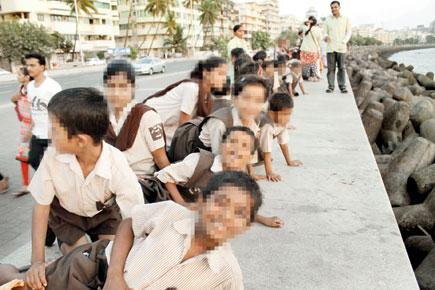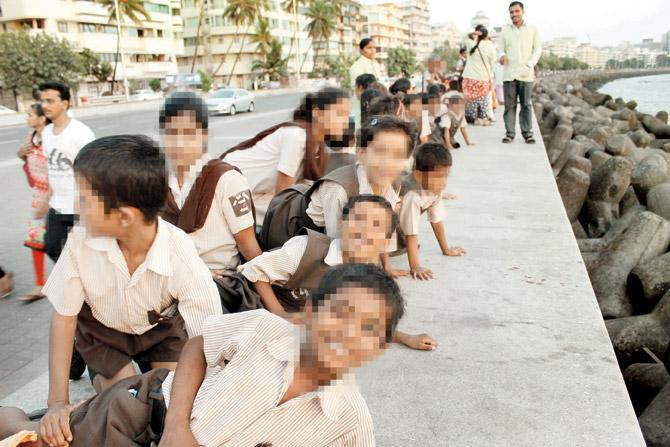Seventy HIV-positive children from a rescue home in Pandharpur are touring Maharashtra with a hit show that makes a case for an inclusive social climate


 Moong dal khichadi is high on the logistics list of a troupe performing the two-hour dance show, Amhi Prakashbeeje (We, The Seeds of Light). The khichadi is not central to the show's message, which speaks of not discriminating against those inflicted with HIV, but has a bearing on the dietary requirements of its 70 child artistes who are touring the state with the performance. The moong dal-rice meal is a nutritious and safe meal they have learnt to make at the Palawi rescue home in Pandharpur where they live. By keeping their promise to avoid street food, which plays havoc with their digestion, the performers get the chance to essay their parts in the play that's now in the second year. Their next show is coming up in August at Pune's Balgandharva auditorium.
Moong dal khichadi is high on the logistics list of a troupe performing the two-hour dance show, Amhi Prakashbeeje (We, The Seeds of Light). The khichadi is not central to the show's message, which speaks of not discriminating against those inflicted with HIV, but has a bearing on the dietary requirements of its 70 child artistes who are touring the state with the performance. The moong dal-rice meal is a nutritious and safe meal they have learnt to make at the Palawi rescue home in Pandharpur where they live. By keeping their promise to avoid street food, which plays havoc with their digestion, the performers get the chance to essay their parts in the play that's now in the second year. Their next show is coming up in August at Pune's Balgandharva auditorium.
ADVERTISEMENT
The joke in the Palawi circuit goes that Amhi Prakashbeeje's success is demonstrated not by the sale of tickets (because shows in and out of Pandharpur have always gone full, sponsored by Palawi's donors), but whether all members of the cast get to perform given their weak immune system. A week before the Mumbai performance at Damodar Hall last November, three children suffered indigestion and one had to be put on intravenous drip after he landed in Mumbai. It is another story that the indisposed children did their best on stage.
"Usually, we don't replace these kids immediately [when they fall ill] because that has an impact on their recovery. We wait for the health update on the day of the performance. In a cast of 70, each performer renders at least three dance-drama sequences, which makes it difficult to substitute them," says Dimple Ghadge, 46, a Palawi backstage manager, who has been travelling with the artistes.

Palawi, which turns 16 this year, is a project of the family-owned non-governmental Prabha-Hira Pratishthan Trust floated by Ghadge's mother, Mangal Shah, in 1996 in Pandharpur. The residential home currently houses 110 HIV-positive children (aged 2 months to 21), rescued from cities as diverse as Gulbarga, Aurangabad and Bhiwandi. Palawi has been also providing special schooling since 2013. The first batch of ten passed SSC this year, all of whom perform in Amhi Prakashbeeje.
Shah says the production has turned out exactly the way it was designed - an in-house vantage point as well as a tool to engage with the larger world. The daily rehearsal for the show adds colour to the children's lives; likewise, the police and other rescue agencies are able to reach Palawi through the show. One of the dramatised sequences in which an infant (one of Palawi's infants plays the part) is rescued from the trash, remains central to its message. It is an appeal to parents with full-blown AIDS not to abandon their offspring [fearing they have passed on their condition] out of shame. "We plead to the larger public not to fritter away the seeds of light in trash cans, nullahs or crematoriums, where children are often found. Parents, however desperate, must do a respectful handover to institutions like Palawi or any recognised body, which increases the life expectancy of the child," Shah maintains. Palawi's children, who declare their HIV-positive status in the production's publicity, invites as well as the script, interact with the audience after each show, particularly the older ones who can articulate why they prefer to share their stories rather than hide them.
The show - a medley of motivational aerobics, local sports, numbers devoted to themes of national integration, a flavour of folk dances, and a dash of mime - underlines the childrens' potential to lead healthy lives, if nurtured at an early stage; their prospect of schooling, if institutions don't close their doors on them; their scope of earning a livelihood, if given age-appropriate vocational training. When donors approach Palawi, Shah encourages them to contribute in creative ways that go beyond cash donations. She recalls the story of Sangli-based director-choreographer Mahesh Patil who helped mount the play as Palawi's long-term tool of engagement. Patil and his wife had come to Palawi two years ago to buy its merchandise (quilts, purses, souvenirs made by the AIDS-affected elder women who work under the micro-credit savings and self-employment schemes initiated by Prabha-Hira Pratishthan). Shah had heard of Patil's Mulukh Marathi dance show which included over 100 child artistes. Patil had earned a reputation for teaching lavani and other native folk dances to American children. Shah made him an offer - she asked him to temporarily shift base to Pandharpur and stay with the kids - which he did not refuse.

Patil started visualising a transportable set for the show. Since Sangli offered better fare for artistes' drapery, stage props and other accoutrements, he shopped in his city and gradually couriered parts of the set and costumes to Palawi. "Mangaltai gave me a specific brief - she wanted a technically sound production which could earn the respect and attention of the audience; at the same time it had to be an effective in-house tool to keep the children in good spirits. Palawi's success rests on keeping the children joyful and charged, so that they overcome physical debilities," recalls Patil, for whom it wasn't easy to conduct rehearsals amid medical emergencies. There were tenuous moments when the effort did not seem doable, specifically when two children passed away, leaving a pall of gloom in the rehearsal space. But, just when Patil was thinking of abandoning the show, since it had by then crystallised into an ambitious two-hour event, children clung to the idea. They did not want to give up, recalls 18-year-old Shivaji (none of Palawi's residents have second names) recalls, who has secured 63 per cent in the recently held std 10 board exams and wants to pursue hotel management, "We have only good memories about the practice; that was as good as the show itself. And of course, we were all talking about the majja it held - the possibility of visiting cities and people we hadn't seen. We can do anything to keep that going on." Interestingly, Palawi holds a monthly series of motivational lectures by kirtankars and other speakers from Pandharpur, which helps counter health-induced depression among the children.
Excursions are also encouraged, whether routine ones like birthday visits to the iconic Vithal Mandir or a treat to the movie of the season, Bahubali included.
Amhi Prakashbeeje's role as a tool to fight depression is acknowledged by many. Alandeep Tapre, the Math teacher who has coached Palawi's students over eight years (much before the school got the SSC board recognition), observes: "The show has become their identity, also a relief from the school routine. Even the hint of an offer to perform in bigger metros motivates the kids." Police inspector Dayanand Gawade, who has worked over the last four years with Palawi, says, "I have seen infants, brought in the worst infected condition, grow into smiling toddlers. It is great to see them dance to songs that take on social subjects like farmers' suicides and terrorism."
Palawi's wider connect with Pandharpur reflects in the positive response from different sections, and in the fact that the show's HIV-positive cast has a large family of friends. Be it chartered accountant Sanjeev Kothadiya, writer-researcher Abhay Joshi, yoga instructor Ashok Nanavare, or grocery goods distributor Siddharth Phade. Incidentally, Palawi's kids make an impact on the annual Ashadi Ekadashi event in Pandharpur. This year, they vended bottled water, hand towels and incense sticks to Lord Vithal devotees who take the annual barefoot pilgrimage to their temple town. The trademark cotton carry bags made by the children were a big hit at this year's wari. Palawi's 18-year-old Sukanya, says, "When there are so many friends - and Lord Vithal in your own city - we feel special. We want to share our story. The show helps us connect with people and tell them our future plans. Each of us has one. Mine is to be an accountant. I like maths."
Sumedha Raikar-Mhatre is a culture columnist in search of the sub-text. You can reach her at sumedha.raikar@gmail.com
 Subscribe today by clicking the link and stay updated with the latest news!" Click here!
Subscribe today by clicking the link and stay updated with the latest news!" Click here!







